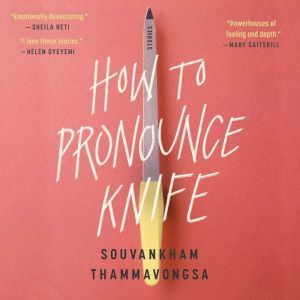Quotes
"An impressive debut...Thammavongsa's spare,
rigorous stories are preoccupied with themes of alienation and
dislocation, her characters burdened by the sense of existing unseen... Her gift for the gently absurd means the
stories never feel dour or predictable, even when their outcomes are by some
measure bleak...It is when the characters' sense of alienation follows them home,
into the private space of the family, that Thammavongsa's stories most wrench the heart."—NEW YORK TIMES BOOK REVIEW
**Named one of the most anticipated books of 2020 by Electric Literature, The Millions, and Ms. Magazine**
**Named one of the most anticipated books of the month by the New York Times, O. The Oprah Magazine, Vogue, Bustle, and Salon**
"These poignant and deceptively quiet stories are powerhouses of feeling and depth; How to Pronounce Knife is an artful blend of simplicity and sophistication."—MARY GAITSKILL, author of VERONICA and SOMEBODY WITH A LITTLE HAMMER
"In sparse prose
braced with disarming humor, Thammavongsa offers glimpses into the daily lives
of immigrants and refugees in a nameless city, illuminating the desires,
disappointments, and triumphs of those who so often go unseen...Though short
enough to read in one sitting, [these stories] feel vast in their scope,
offering ample room to wander."—THE PARIS REVIEW
"I love these stories. There's some fierce and steady activity in all of the sentences-something that makes them live, and makes them shift a little in meaning when you look at them again and they look back at you (or look beyond you)."
—HELEN OYEYEMI, authorof WHAT IS NOT YOURS IS NOT YOURS and GINGERBREAD
"In Thammavongsa's work, refugees don't have to be just tragic or sad but can be imbued with humor, complexity, and the unexpected. Most importantly, Thammavongsa doesn't write for a white audience. She writes, tenderly and profoundly, for her characters. Her love is apparent in her delicate descriptions: confident children protect their parents, workers perform jobs with care and pride, and messy love stories show us that leaving is proof we are alive. The power of How to Pronounce Knife lies in seeing the unseen. I know that firsthand--as the daughter of refugees, I'm able to finally see myself in stories."—ANGELA SO, ELECTRIC LITERATURE
"Fourteen piercing
sketches illuminate the workaday routines and the interior lives of Laotian
refugees. Characters who undertake 'the grunt work of the world', laboring in
poultry plants, hog farms, and nail salons, also harbor vivid fantasies... brief
glimpses of freedom in otherwise impenetrable places."—NEW YORKER
"Souvankham
Thammavongsa writes with deep precision, wide-open spaces, and quiet, cool,
emotionally devastating poise. There is not a moment off in these affecting
stories."—SHEILA HETI, author of HOW SHOULD A PERSON BE and MOTHERHOOD
"Deceptively devastating...strange but biting stories."—TIME MAGAZINE
"Tinged with melancholy, anger, and a healthy dose of dark
humor, all of these stories exhibit a fierce pride in what one can accomplish.
After leaving everything behind and dealing with a country that does not cater
to you, one can still celebrate the resilience of the human spirit by merely
surviving."—SALON



